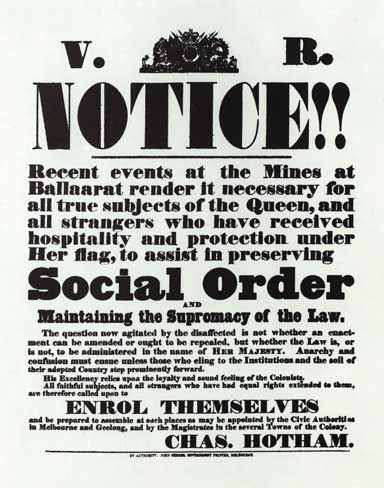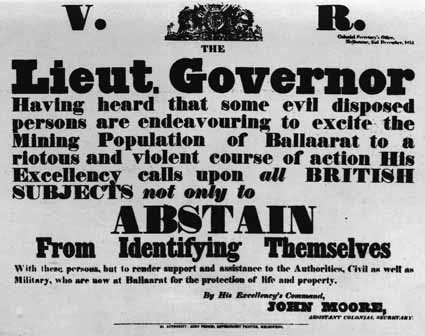Difference between revisions of "The Role of Foreigners at Eureka"
| Line 1: | Line 1: | ||
| − | + | [[File:1996.63 - Doudiet - Gravel Pits Ballarat-wiki.jpg|1000px|thumb|right|Charles A. Doudiet, ''Gravel Pits Ballarat,'' 1854, watercolour, pen and ink on paper. <br>Courtesy Art Gallery of Ballarat, purchased by the Ballarat Fine Art Gallery with the assistance of many donors, 1996.]] | |
By Clare Gervasoni | By Clare Gervasoni | ||
Revision as of 14:58, 24 February 2019
By Clare Gervasoni
From a talk delivered at the Reclaim the Radical Spirit of the Eureka Rebellion Annual Dinner, 03 December 2011
There is an interesting preoccupation with foreigners at Eureka. Governor Charles Hotham reports to Sir William Denison on 04 Dececember 1854 states ‘The insurgents are principally foreigners, well drilled, and said to be well commanded’. Were they principally foreigners? If not why did they stand out to the extent the posters and communications suggest?
Looking at the term foreigner in Colonial Victoria we could simply define a foreigner as non British. Many were non-English speakers, but English speakers such as Canadians and Americans also fell inside the 'foreign' description.
Macquarie Dictionary Definitions
| # | Foreigner | Alien |
|---|---|---|
| 1. Pertaining to, characteristic of, or derived from another country or nation; not native or domestic | 1. One born in or belonging to another country who has not acquired citizenship by naturalisation and is not entitled to the privileges of a citizen | |
| 5. Belonging to or coming from another district, province, society, etc | 2. A foreigner | |
| 7. Law. Outside the legal jurisdiction of the state; alien | 4. One who has been estranged or excluded; an outsider | |
| 12. Strange or unfamiliar | 5. Residing under another government or in another country than that of one’s birth |
The Macquarie Dictionary includes definitions for the word foreigner in a number of ways. If you consider chart above with the use of the words 'Foreigner' and 'Alien' during the Eureka Stockade it would be easy to deide that every person at the Eureka Stockade was a foreigner. Definition 7 considers the word foreigner from a legal point of view, and uses the term Alien. According to the Macquarie Dictionary an alien is a person from another country, who is not naturalised and is not therefore entitled to the privileges of a citizen, or, as definition 5 suggests, someone living under another government or in another country than that of one’s birth.
During the Eureka Stockade era any non-British subject was considered a foreigner - they were strangers receiving the hospitality and protection of Queen Victoria.
On 04 December 1854 Governor Charles Hotham published in the Government Gazette:
- Recent events at the Mines at Ballarat render it necessary for all true subjects of the Queen, and all strangers who have received hospitality and protection under Her flag, to assist in preserving Social Order and maintaining the Supremacy of the Law.
It is interesting to consider Hotham’s use of the phrase ‘true subjects of the Queen’. The Irish were British subjects, but the South Irish in particular may have preferred NOT to be described in that manner. Would J.B. Humffray have described himself as British or Welsh?
The term Stranger is also interesting. In this context it means a foreigner – but is also has the word STRANGE within it. Foreigners were seen as different.
According to the Victorian Census of 1854 Ballarat had the highest goldfield population with 18,564 people, followed by Sandhurst with 15,953. The Ballarat goldfield had 16,974 British subjects and 1,585 foreigners – or roughly about 1 foreigner for every 8 British subjects. Interestingly Sandhurst had 13,212 British subjects and 2,693 Foreign Subjects or 1 foreigner for every 5 British subjects.
Clearly there are a lot more British than foreigners on the goldfields, and of the foreigners, the largest percentage were on the goldfields compared to other parts of the colony. Out of all British subjects in Victoria 27.45% were located on the goldfields, with 58.74 % of all Foreigners in Victoria were located on the goldfields.
When Governor Charles Hotham stated ‘The insurgents are principally foreigners, well drilled, and said to be well commanded’ why did he emphasis foreigners?? There are a variety of answers including:
- They stood out as different (different language, costume, food, etc);
- They required English language to be translated;
- It is easy to lay blame at non-British (scape goat);
- Foreigners often congregated together, making their differences appear more threatening;
- Numbers of foreigners may have appeared large in comparison to British
- Many foreigners on the goldfield had been involved with radical movements of 1848, such as Italian wars of Independence, and the French Revolution.
The Victorian goldfields offered the opportunity to turn over the normal social order and start a new, fresh start in the South.
It is interesting to consider the 'Social Order' poster in light of the many different ways it may have been received depending on the experience and viewpoint of the reader. What if you hadn’t received hospitality and protection under the flag (Chinese)? what if you weren’t a true subject of the Queen (Irish)? What if you were a stranger who had NOT had equal rights extended to them? How would a translator would have translated it to a non-English speaker. We can't answer these questions in hindsight, but we could try to empathise with differing groups.
Up until 1863 Aliens, or non-British foreigners, could not own land in Victoria. As a result many were naturalised to enable them to purchase property. In 1865 those applying for naturalisaton had to "sincerely promise and swear that I will be faithful and bear true allegiance to her Majesty Queen Victoria, as lawful Sovereign of the United Kingdom of Great Britain and Ireland, and this Colony of Victoria – So help be God."
The naturalisaton papers are some of my favourite records. We can gain a lot of insight from them for example Raffaello Carboni, the Italian tried for treason, applies to Governor Charles Hotham in 1855 for naturalisation. In the previous year he had been involved at the Eureka Stockade, been tried for treason, and was using the law of the day to his advantage to apply for naturalisation.
He gives his name, Place of birth, Date of arrival in the colony and name of the ship, Number of years in the Colony of Victoria, and attaches certificates of character from respectable persons. He gave his reasons for naturalising - he wanted to purchase real estate and is anxious of availing himself of the privileges granted to aliens when becomes naturalised citizens.
Between the foundation of the Commonwealth in 1901 and the proclamation of the Nationality and Citizen Act 1948 on 26 January 1849, British Subject remained the only formal civic status. He signed the document on 26 November 1855 and described himself as a member of the local Court Ballarat. Shamefully, Aborigines were denied the status of Australian citizens until 1967.
It is often difficult to uncover information on non-English speakers. It was difficult for the English speaking authorities to communicate with them, they had strange names that were hard to remember and pronounce, and differing conventions resulting in errors such as Carboni’s name in this legal document – Charles Raphaelo.
Imagine being a non-English speaker on the Ballarat Goldfields in 1854, or Carboni being arrested after the Eureka battle. How did the non-English speakers learn about the license system? How did they know about the Bakery Hill Meetings? What were they thinking while standing on Bakery Hill amidst 10,000 people listening to words they could not understand? Interpreters such as Carboni were important for around 1/8 of the population on the Ballarat goldfield.
Raffaello Carboni was the translator of the Ballarat Reform League message of non-English speaking residents of Ballarat. He wrote the only eye-witness account of Eureka. In his Carboni’s Eureka Stockade he writes:
- Foreigners From All Quarters Of The Globe And Of The Diggings, Came To Inquire From Me What Was The Matter Concerning So Much Excitement As Then Prevailed On Ballaarat. I translated for them the news from our 'Ballaarat Times', or from The 'Geelong Advertiser's' clever correspondent.
Foreigners also produced great eye-witness accounts of the Eureka Stockade such as Carboni’s book and Charles Doudiet’s paintings.


